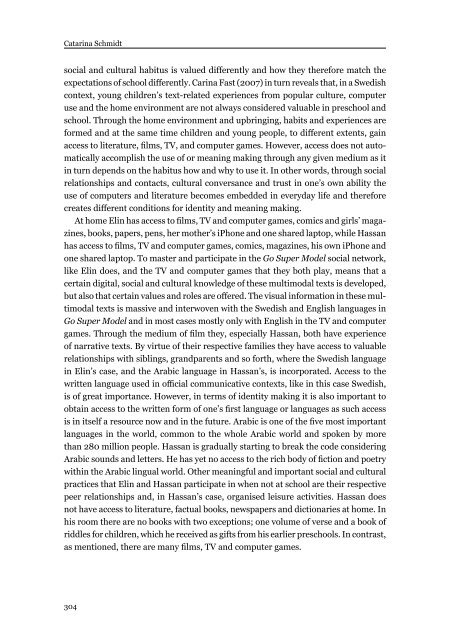Download issue - Umeå universitet
Download issue - Umeå universitet
Download issue - Umeå universitet
Create successful ePaper yourself
Turn your PDF publications into a flip-book with our unique Google optimized e-Paper software.
Catarina Schmidt<br />
social and cultural habitus is valued differently and how they therefore match the<br />
expectations of school differently. Carina Fast (2007) in turn reveals that, in a Swedish<br />
context, young children’s text-related experiences from popular culture, computer<br />
use and the home environment are not always considered valuable in preschool and<br />
school. Through the home environment and upbringing, habits and experiences are<br />
formed and at the same time children and young people, to different extents, gain<br />
access to literature, films, TV, and computer games. However, access does not automatically<br />
accomplish the use of or meaning making through any given medium as it<br />
in turn depends on the habitus how and why to use it. In other words, through social<br />
relationships and contacts, cultural conversance and trust in one’s own ability the<br />
use of computers and literature becomes embedded in everyday life and therefore<br />
creates different conditions for identity and meaning making.<br />
At home Elin has access to films, TV and computer games, comics and girls’ magazines,<br />
books, papers, pens, her mother’s iPhone and one shared laptop, while Hassan<br />
has access to films, TV and computer games, comics, magazines, his own iPhone and<br />
one shared laptop. To master and participate in the Go Super Model social network,<br />
like Elin does, and the TV and computer games that they both play, means that a<br />
certain digital, social and cultural knowledge of these multimodal texts is developed,<br />
but also that certain values and roles are offered. The visual information in these multimodal<br />
texts is massive and interwoven with the Swedish and English languages in<br />
Go Super Model and in most cases mostly only with English in the TV and computer<br />
games. Through the medium of film they, especially Hassan, both have experience<br />
of narrative texts. By virtue of their respective families they have access to valuable<br />
relationships with siblings, grandparents and so forth, where the Swedish language<br />
in Elin’s case, and the Arabic language in Hassan’s, is incorporated. Access to the<br />
written language used in official communicative contexts, like in this case Swedish,<br />
is of great importance. However, in terms of identity making it is also important to<br />
obtain access to the written form of one’s first language or languages as such access<br />
is in itself a resource now and in the future. Arabic is one of the five most important<br />
languages in the world, common to the whole Arabic world and spoken by more<br />
than 280 million people. Hassan is gradually starting to break the code considering<br />
Arabic sounds and letters. He has yet no access to the rich body of fiction and poetry<br />
within the Arabic lingual world. Other meaningful and important social and cultural<br />
practices that Elin and Hassan participate in when not at school are their respective<br />
peer relationships and, in Hassan’s case, organised leisure activities. Hassan does<br />
not have access to literature, factual books, newspapers and dictionaries at home. In<br />
his room there are no books with two exceptions; one volume of verse and a book of<br />
riddles for children, which he received as gifts from his earlier preschools. In contrast,<br />
as mentioned, there are many films, TV and computer games.<br />
304

















